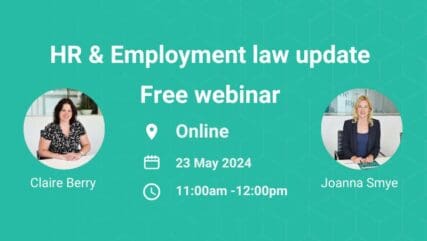
HR & Employment law 2024 update webinar
Join our experts for an important employment law update webinar, delivered by our employment solicitors, Claire Berry and Joanna Smye, who will discuss the most important employment law changes in 2024.
We have worked with law firms for many years, and are market leaders in providing business advice and accountancy services to law firms, barristers’ chambers, and consultants.
We understand the importance of specialist advice and the effect it can have on your business.
Our specialists also provide a comprehensive range of services to individuals including, personal tax advice, financial modelling, investment management, and pension and retirement planning.
Rising company confidence and expanding M&A activity are anticipated to drive demand this year, while an increase in firms is anticipated to broaden the industry’s potential customer base. Despite this, economic uncertainty is subduing consumer confidence, which is potentially going to restrict revenue growth this year.
Law firms are also facing increasing competitive pressure as a result of the Legal Services Act 2007, introduced in 2011, allowing non-legal firms to own law firms through alternative business structures (ABSs). Clients now expect more from legal firms including upfront costs, which has seen a big change in many business models in order to keep up with competition.
No matter the challenges you are facing, we understand them. With offices across London and East Anglia, and a strategic international presence, our specialist teams can help you to overcome these challenges, with advice that is tailored to your firm.
Introduced on 6 October 2011, Alternative Business Structures (ABS) let legal professionals and non-lawyers share the management and ownership of a practice, offering reserved legal services to the public.
This allows more flexibility than traditional law firms, opening up new and exciting opportunities for both legal and non-legal professionals. For example, you can offer a variety of services to clients within the same entity, and be known as a multidisciplinary practice.
An ABS must be licensed by the SRA and meet a range of requirements. We can advise you on these, and help you decide whether an ABS is for you. If you go ahead, we can guide you through the application process.
We were one of the first accountancy firms to take on limited liability status, and started trading as a limited liability partnership (LLP) from 1 April 2004.
Since then, we’ve helped many law and accountancy firms – and other practices in professional services and healthcare – to convert to LLP status.
As an LLP, you combine the benefits of limited liability with the flexibility of organising your internal structure as a traditional partnership. You have the same tax rules as a partnership, you can secure bank borrowings on debtors, and you can create a more corporate structure with its own assets and subsidiary companies.
There’s a lot to consider when setting up an LLP – such as engagement terms, profit sharing and exit strategies. We can help you through the process, making it as smooth as possible for everyone involved, including partners, employees, bankers, clients, landlords and suppliers.
Alternatively, conversion to a limited company might be more appropriate for your firm. You might be attracted by the extra credibility that corporate status can bring, or by the ability to pay dividends to shareholders or set up an approved pension scheme. We can advise you on the implications, and help you with all aspects of conversion.
The partners in your firm are key to your overall business performance.
The PDR process can help direct and motivate them, by ensuring they each have a defined role, and that they’re using their strongest skills for the benefit of the whole organisation. We’ve been delighted with the results of the process in our own firm, and we now help implement it with other practices.
Our PDR information pack contains all you need to set up the process: partner role specifications, core skills and tasks, and how to apply and measure the process in practice – including easy-to-use on-screen 360-degree feedback. And, of course, we’re here to advise you on any aspects of your PDR.
Contact us today to find out more about how we can help you

Join our experts for an important employment law update webinar, delivered by our employment solicitors, Claire Berry and Joanna Smye, who will discuss the most important employment law changes in 2024.



Every quarter, our Academies team will publish the most important and frequently asked helpdesk queries. You can download our 2024 quarterly updates here.


Understand the VAT implications for doctors' practices, from exemptions to reclaiming VAT on taxable supplies. Essential insights for healthcare professionals.


Accounting and advisory firm Price Bailey unveils four new promotions and announces that two new appointments will be joining the Partnership team in the year ahead.